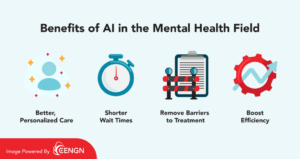The demanding journey of pursuing higher education or a college/university degree is renowned for its intense workload, high expectations, and immense pressure.

While the academic and professional benefits are substantial, the toll it can take on students’ mental health is a well-acknowledged concern. This lifestyle characterized by rigorous coursework, group projects, networking events, and internships can lead to increased stress, anxiety, and even burnout among students. The pressure to excel academically, secure internships, and establish a strong professional network can weigh heavily on students, often causing their mental well-being to take a back seat. As a new term starts, it is a good time to learn more about mental health and get to know the highly accessible apps and tools that are available.
AI technologies, such as natural language processing and sentiment analysis have the capability to analyze user interactions and identify signs of distress, anxiety, or depression in their posts and comments. This data can be used to provide personalized interventions, resources, and support. For MBA students, this could mean tailored suggestions for stress management techniques, time management strategies, or even recommendations for seeking professional counseling. Prescription Digital Therapeutics(PDTs) are also an emerging option to address mental health challenges and can be prescribed by a doctor through the use of – a mobile, computer, or tablet. Additionally, PDTs are less likely to cause side effects, are studied for safety and effectiveness, are convenient, and can be accessed in the privacy of one’s home. Standardizing the use of these tools can help in making quality care available and at the same time help reduce the stigma around mental health. Below is a short list and description of some of these apps:
- Wysa: Wysa is an AI-driven mental health app that aims to provide immediate support for those in need. Utilizing clinically validated conversational AI, the app evaluates a user’s chat responses to offer an initial step of care, with human coaching available for those who require additional assistance. The AI uses a combination of artificial intelligence, natural language processing (NLP), and evidence-based therapeutic techniques to interact with users and offer emotional support and mental health assistance. It provides emotional help by tracking mood, highlighting optimism, and reframing thinking (CBT) in an approachable manner. This innovative approach can significantly transform the level of support experienced by people dealing with mental health issues.
- Breathhh: Breathhh is an AI-powered Chrome extension designed to automatically deliver mental health exercises based on an individual’s web activity and online behaviors. By monitoring and analyzing the user’s interactions, Breathhh can determine appropriate moments to present stress-relieving practices and strategies. This unique approach combines AI technology with practical mental health support, making it seamless and easy for users to incorporate self-care into their daily routines.
- Youper: Youper is another example of AI integration in mental health care. Its mission as a healthcare technology company is to make mental healthcare accessible for everyone. The Youper AI assistant engages in meaningful conversations with users to gauge their mental state and provides tailored solutions based on the insights gathered. This innovative approach ensures that individuals receive personalized support, further emphasizing the potential of AI in revolutionizing mental health care.
- Woebot: Woebot is a chatbot developed by researchers at Stanford University that offers cognitive-behavioral therapy (CBT) techniques through conversation. Originally available as a standalone app, Woebot has also integrated with platforms like Facebook Messenger, allowing users to access mental health support directly from the messaging app.
- EndeavorRx®, an immersive video game for children living with ADHD, targets areas of the brain to improve ADHD-related symptoms such as focus
- NightWareTM, a PDT that’s been proven to improve sleep quality in people with PTSD, uses sensors to identify nightmares and interrupt them without waking the patient
- Mahana™ IBS, an app that uses cognitive behavioral therapy to reduce IBS symptom severity
 While technology-powered mental health support holds tremendous potential, there are challenges to address as this requires careful consideration of data privacy, consent, and potential biases in algorithmic decision-making. These applications should be seen as a supplement to traditional mental health services, not a replacement. Direct human interaction remains crucial for complex emotional issues. Moreover, the accuracy of these tools in interpreting emotional states is not perfect. False positives and negatives can occur, which might impact the effectiveness of interventions.
While technology-powered mental health support holds tremendous potential, there are challenges to address as this requires careful consideration of data privacy, consent, and potential biases in algorithmic decision-making. These applications should be seen as a supplement to traditional mental health services, not a replacement. Direct human interaction remains crucial for complex emotional issues. Moreover, the accuracy of these tools in interpreting emotional states is not perfect. False positives and negatives can occur, which might impact the effectiveness of interventions.
Ultimately, the role of technology in mental health should be seen as part of a larger effort to create a supportive and inclusive digital environment. By fostering a community that values mental health and encourages open discussions, we can work towards a future where individuals can access the assistance they need, whether through technology or the warmth of human connection.
